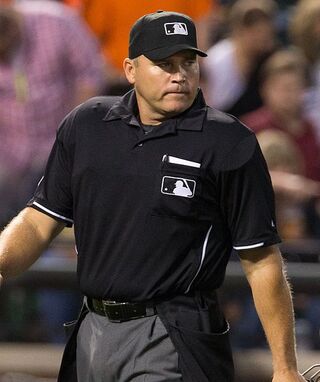Persuasion
How to Influence a Referee Into Helping You Win
Does home advantage explain the current England soccer team's success?
Posted July 9, 2021 Reviewed by Kaja Perina
Key points
- Winning or losing at sports, and in life, is not just about who is better on the day, but can also be about how adjudicators make decisions.
- Officials who are meant to be unbiased have been found to be influenced by extraneous factors such as the colour of the team shirt.
- Sports team managers may try to exert control on referees with comments that get widely reported; can you use the same psychology to your ends?
- Home advantage in sports may be explained by referees being influenced by crowds suggesting even those trained to be impartial can get pressured.
The England soccer team are through to the final of Euro 2021, the first time the nation is in the final of a major tournament since 1966. In that year that historic match was played at Wembley Stadium in London, just as this final will be.

So is this just a coincidence, or how important is the ‘Wembley’ or ‘home advantage’ factor?
Scientists investigating ‘home advantage’ for elite sports have uncovered some surprisingly powerful psychological effects.
Can you use the emotions behind ‘home advantage’ to your personal gain? Is it being used against you in ways you remain unaware of?
Do Managers and Crowds Manipulate Referees?
Sir Alex Ferguson, one of the most successful soccer managers in the English game’s history, explained why his team, Manchester United, lost a crucial Champions’ League match in April 2007, when his squad were playing away to Italian team Roma, with a characteristically abrasive comment on the performance of the referee Herbert Fandel: ‘It was like playing against 12 men’.
Home advantage may be explained by the excessive crowd noise behind a home team influencing referees into making decisions, below conscious awareness, which significantly favour the home team.
A study entitled, ‘Red shirt colour is associated with long-term team success in English football’, found that since 1947, English soccer teams wearing red shirts have been champions more often than expected on the basis of the proportion of clubs playing in red.
That this may be about refereeing decisions is supported by another study which found that given identical performances, judges awarded more points in Tae Kwon Do to fighters who wore red compared with fighters who wore blue.
Indeed, it could be argued that the only reason the current England soccer team are in the final on Sunday night is because of a controversial refereeing decision which favoured the home team (playing at Wembley stadium) in the semi-final. England striker Raheem Sterling went down under what many feel was minimal contact from a Danish defender, yet the referee awarded the penalty to the home team.
Statistical analyses of large numbers of professional soccer games, as well as other sports, have already established that home teams receive fewer referee penalising decisions, than away teams.
An investigation, entitled ‘The 12th man?: refereeing bias in English and German soccer’, used a specific statistical minute by minute analysis of referees penalising players over six seasons in the English Premier League and the German Bundesliga and found significant home team favouritism induced by crowd pressure.
In Germany home teams with running tracks in their stadia attract more penalising yellow and red cards, than teams playing in stadia with less distance between the crowd and the pitch.
In other words, when the crowd is kept back from the pitch by a running track, creating more distance between the crowd and the referee on the pitch, then there is a significant change in the way referees penalise home, as opposed to away teams.
Three teams switched stadium design, with removal of a track during the sample period of the experiment, suggesting that this is an effect recognised by teams themselves, and they are operating behind the scenes to maximise their own advantage.
Previous research investigating the Spanish soccer league, found that referees award less added time after 90 minutes, in games where the home team was ahead and more added time when the home team was behind. Referees in Italy’s top division, Serie A, added significantly greater injury time if home teams were losing. For the German Bundesliga, referees added more time in games where the home team was behind.
What Motivates Referees?
One theory behind this effect is a is a motivational one - maybe referees want to avoid displeasing the crowd, and more so when there is crowd noise; thus, referees call fewer fouls on the home team when crowd noise is present.
Perhaps we need to go even deeper into the motivation of match officials – why do they want to be referees in the first place given how stressful a job this is?
Maybe referees act “as if in the game”, in other words, they see themselves in some sense as players?
In their study entitled, ‘Crowd Noise as a Cue in Referee Decisions Contributes to the Home Advantage’, Christian Unkelbach and Daniel Memmert propose an alternative theory to the motivational one; a more ‘cognitive’ theory.
This is that referees frequently have to make difficult decisions based on judging distance and other three dimensional spatial and object problems, often from a distance, and use crowd noise, perhaps unconsciously, as a way of deciding what actually happened.
In this study published in the Journal of Sport & Exercise Psychology, video clips of fouls from soccer matches were shown to referees, but the volume of crowd noise for each scene was set to high or low randomly during the actual presentation.
High volume crowd noise led to substantially more yellow penalising cards than low volume crowd noise.
Can You Manipulate A Referee?
Another study mathematically analysed referee bias with respect to fouls and penalty kicks awarded during the 2011-12 English Premier League season. This study, published in the journal Psychology of Sport and Exercise, found, even allowing for other possible factors, Manchester United with 9 penalties awarded during that season, was ranked 1st in positive referee bias, while Manchester City with 8 penalties awarded was ranked 2nd.
Certain teams, most specifically Manchester United, benefited from referee bias in their favour during home games.
Maybe when Sir Alex Ferguson, the manager of Manchester Unitied, was complaining about the referee, when his team lost to Roma in an away Champions League fixture, maybe there was a bit of ‘reverse psychology’ in play here?
Perhaps, back in 2007, when he made his ‘playing against 12 men’ complaint about that referee, Sir Alex was already laying the groundwork, for his team’s future success, by influencing referees, before they even arrived at his ground.
Even if you are not an elite athlete, you may face judgements from so-called impartial ajudicators, perhaps at a job interview, or when teachers are evaluating your children.
This body of work indicates you should not take it for granted that unconscious bias may not be in operation. It may still be possible to enter the game yourself, and learn from what some might suggest could be an approach that Sir Alex Ferguson may have been taking, with his carefully chosen words.
Be aware that influential comments, could operate to your advantage, or disadvatage, yet below conscious awareness.
If crowd clamour is a factor, then can England deploy this to maximal advantage on Sunday? Mass noise is much louder in a closed amphitheatre compared with an open one.
Wembley Stadium does not have a retractable roof but, according to Wikipedia, there are two partially retractable roof structures over the east and west ends of the stadium, which can be opened to allow sunlight and aid pitch growth.
Hint, hint.
References
Attrill MJ, Gresty KA, Hill RA, Barton RA. Red shirt colour is associated with long-term team success in English football. J Sports Sci. 2008 Apr;26(6):577-82. doi: 10.1080/02640410701736244. PMID: 18344128.
Hagemann, N., Strauss, B., & Leissing, J. (2008). When the referee sees red.... Psychological Science, 19, 769–771.
The 12th man?: refereeing bias in English and German soccer Babatunde Buraimo, David Forrest, Robert Simmons Journal of the Royal Statistical Society Volume173, Issue2 April 2010 Pages 431-449
Crowd Noise as a Cue in Referee Decisions Contributes to the Home Advantage Christian Unkelbach Daniel Memmert Journal of Sport & Exercise Psychology, 2010, 32, 483-498 2010
Constantinou, A. C., Fenton, N. E., & Pollock, L. J. H. (2014). Bayesian networks for unbiased assessment of referee bias in Association Football. Journal of Psychology of Sport and Exercise, Vol. 15, 5: 538-547.




